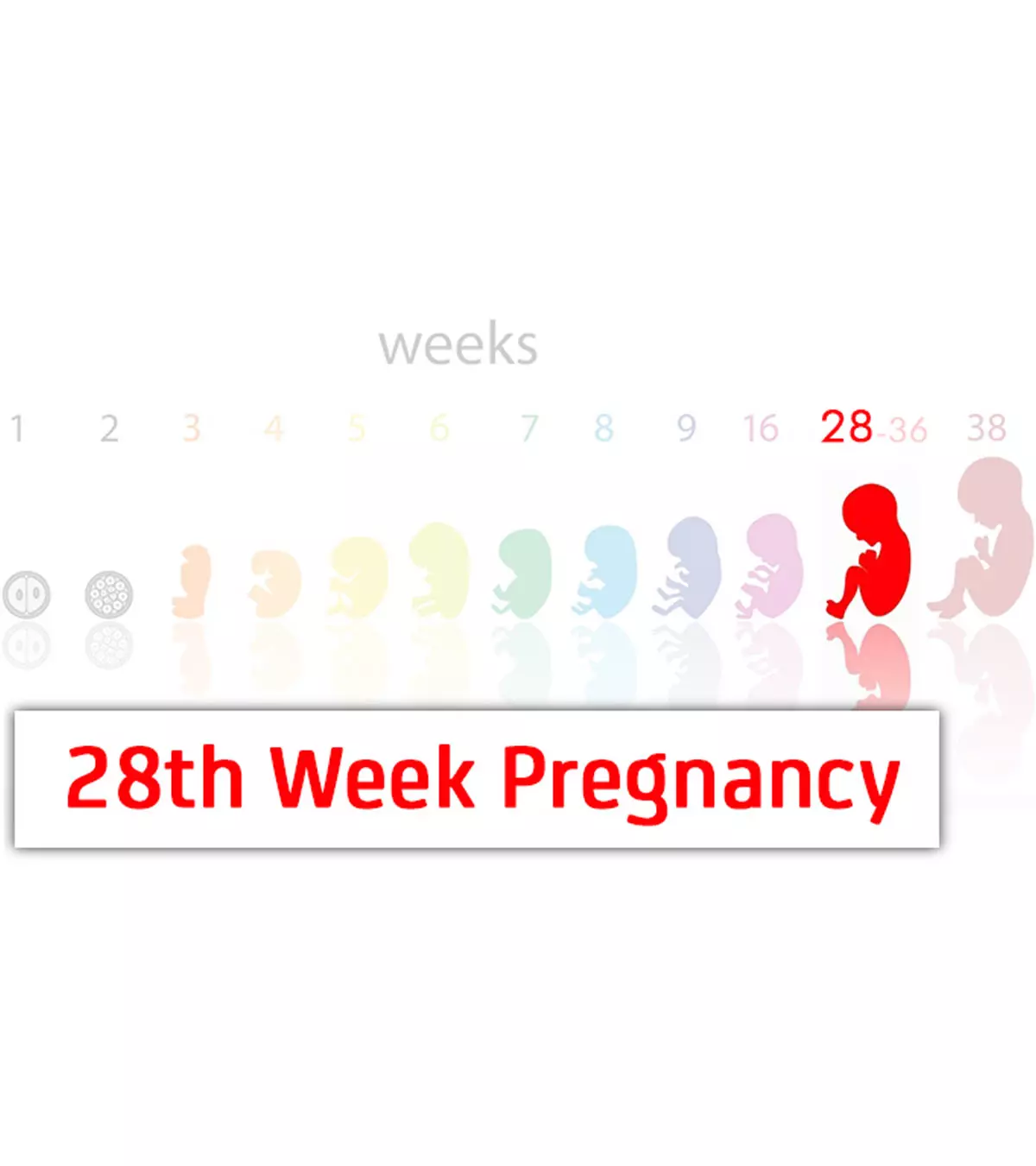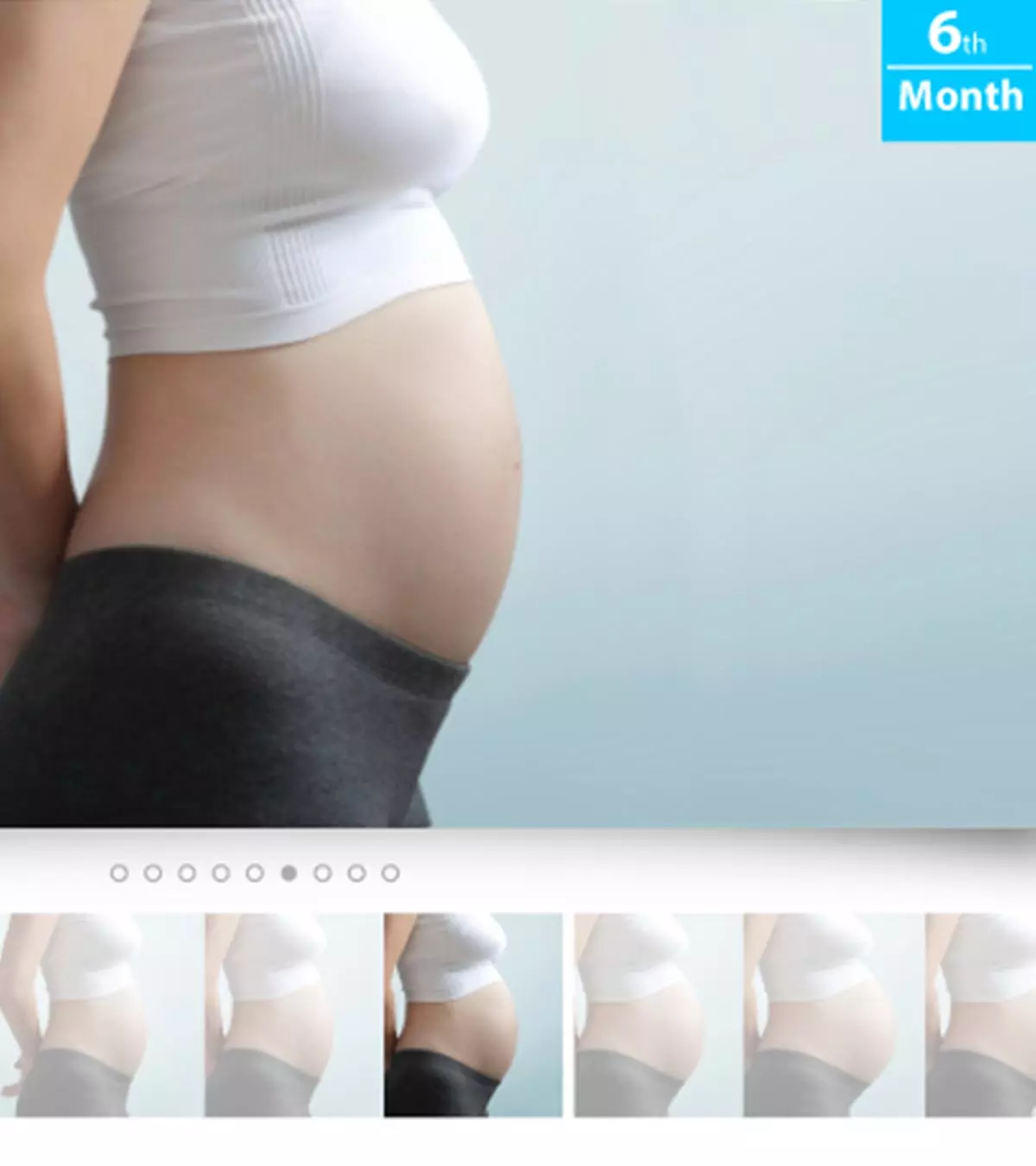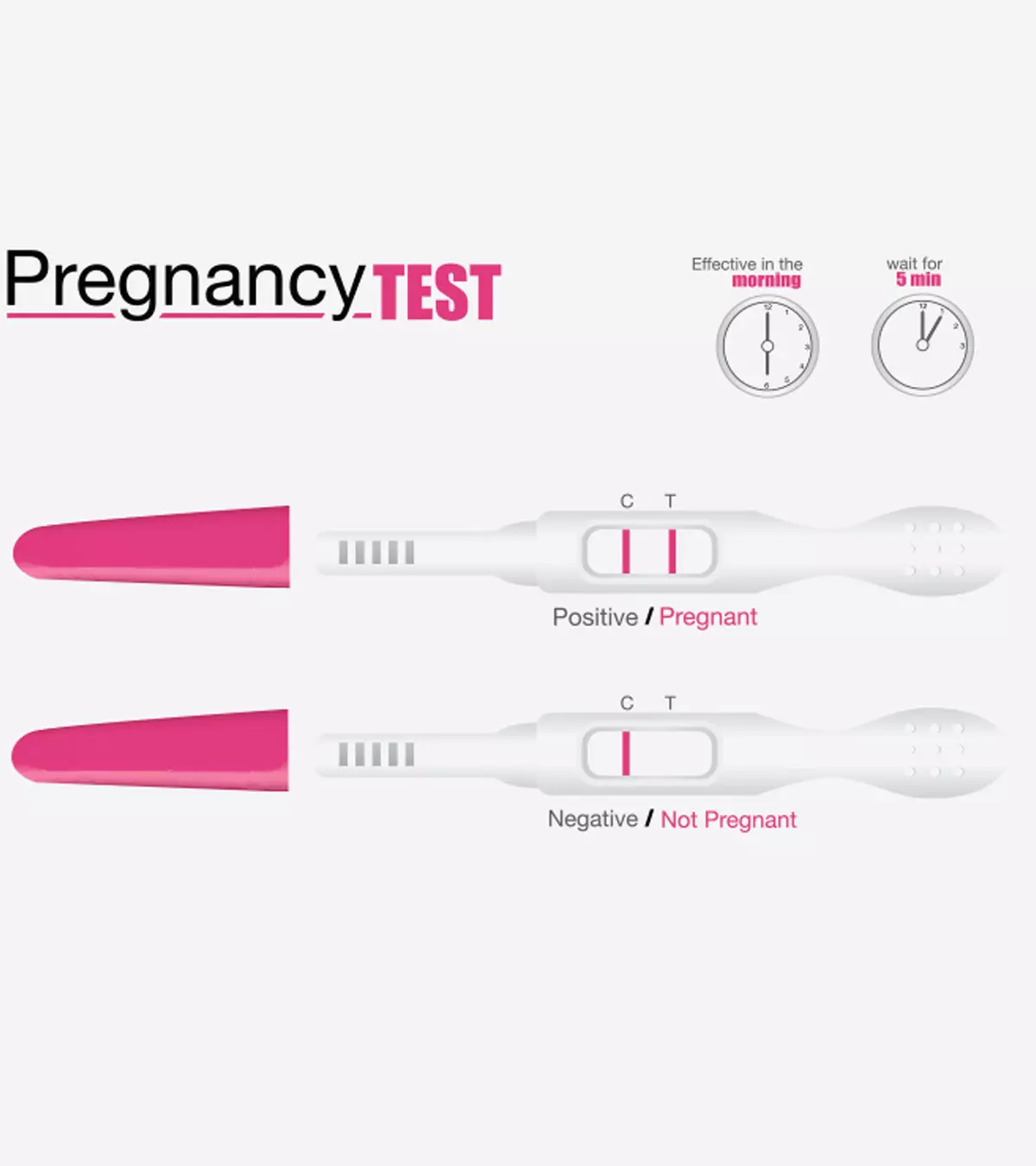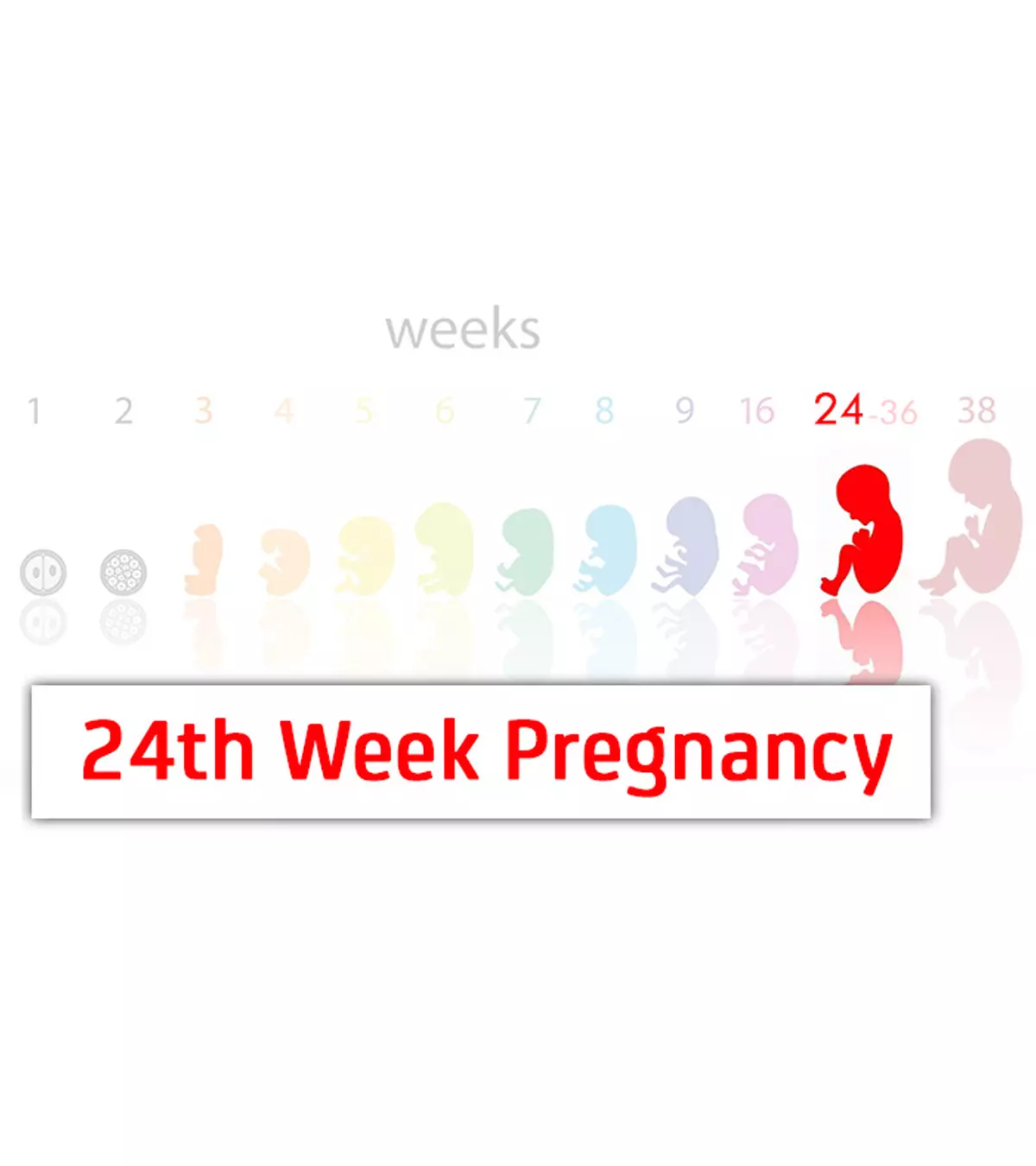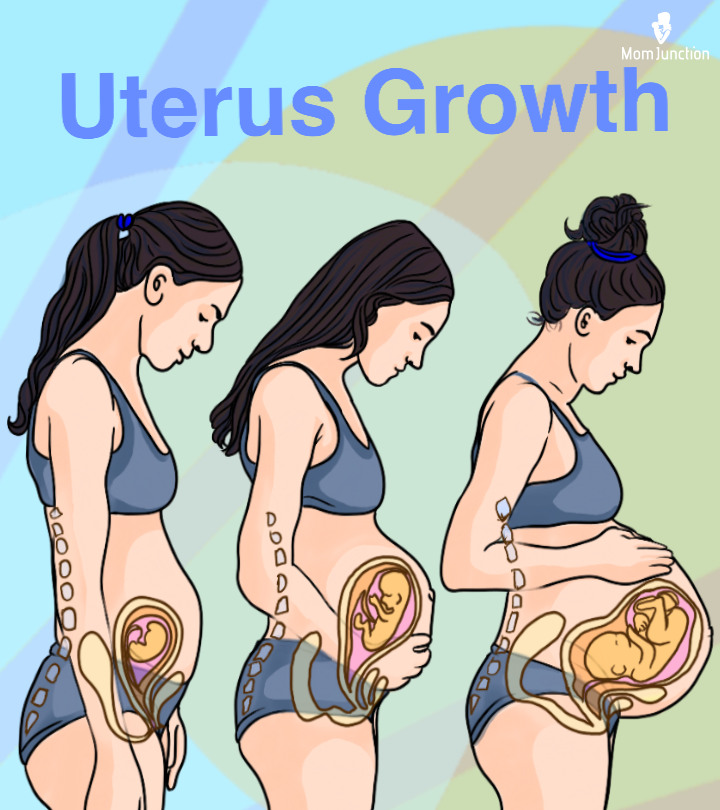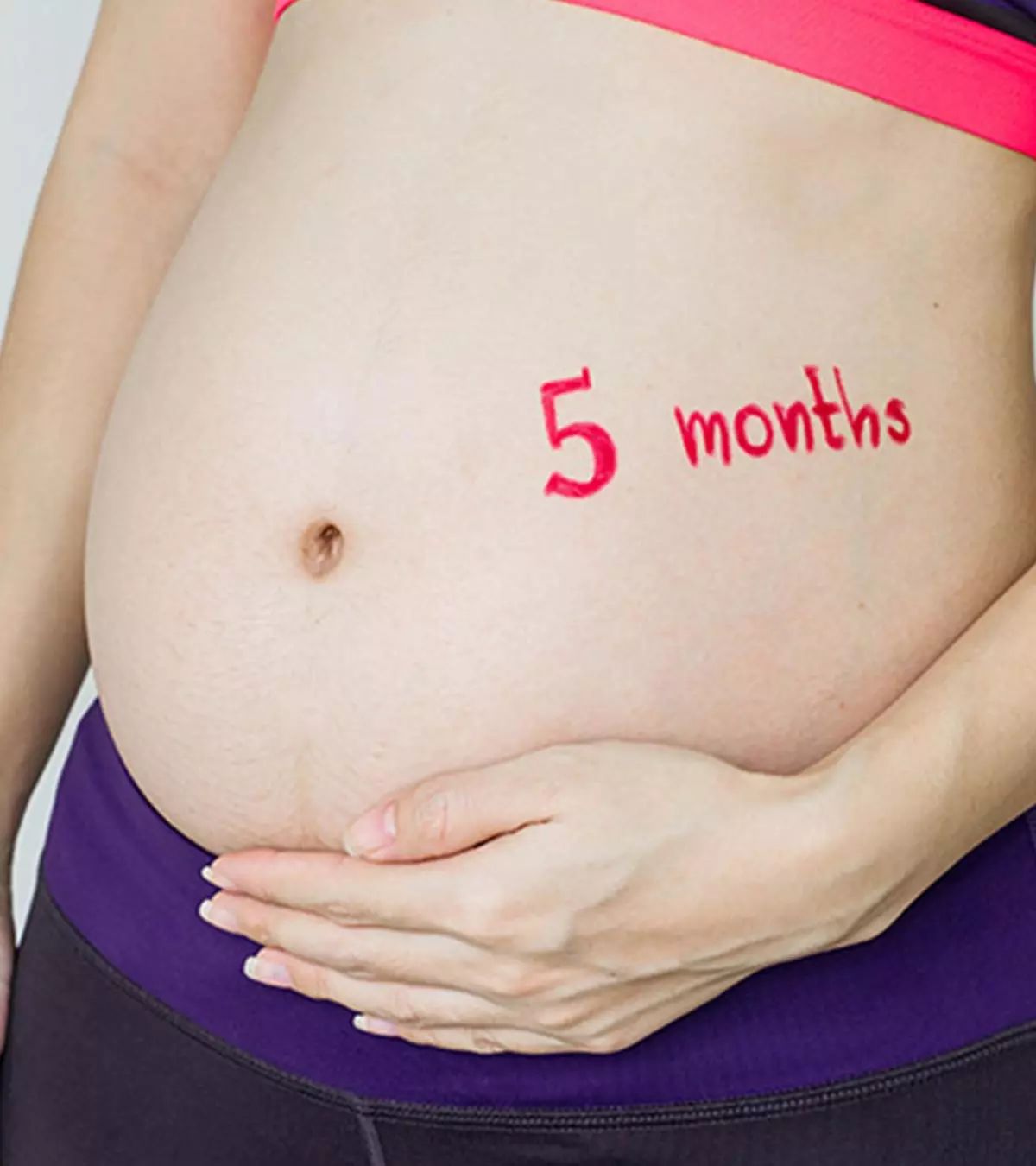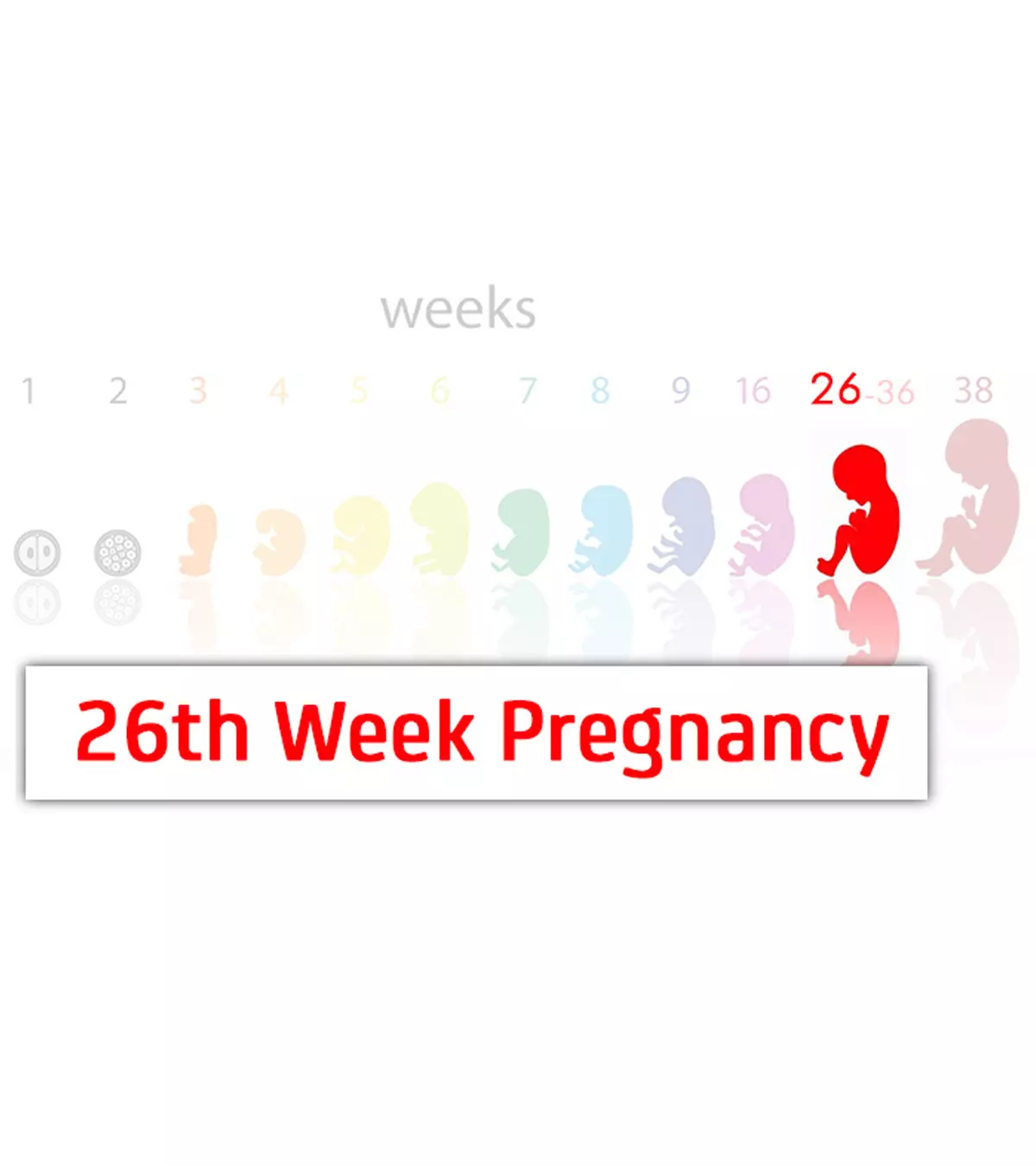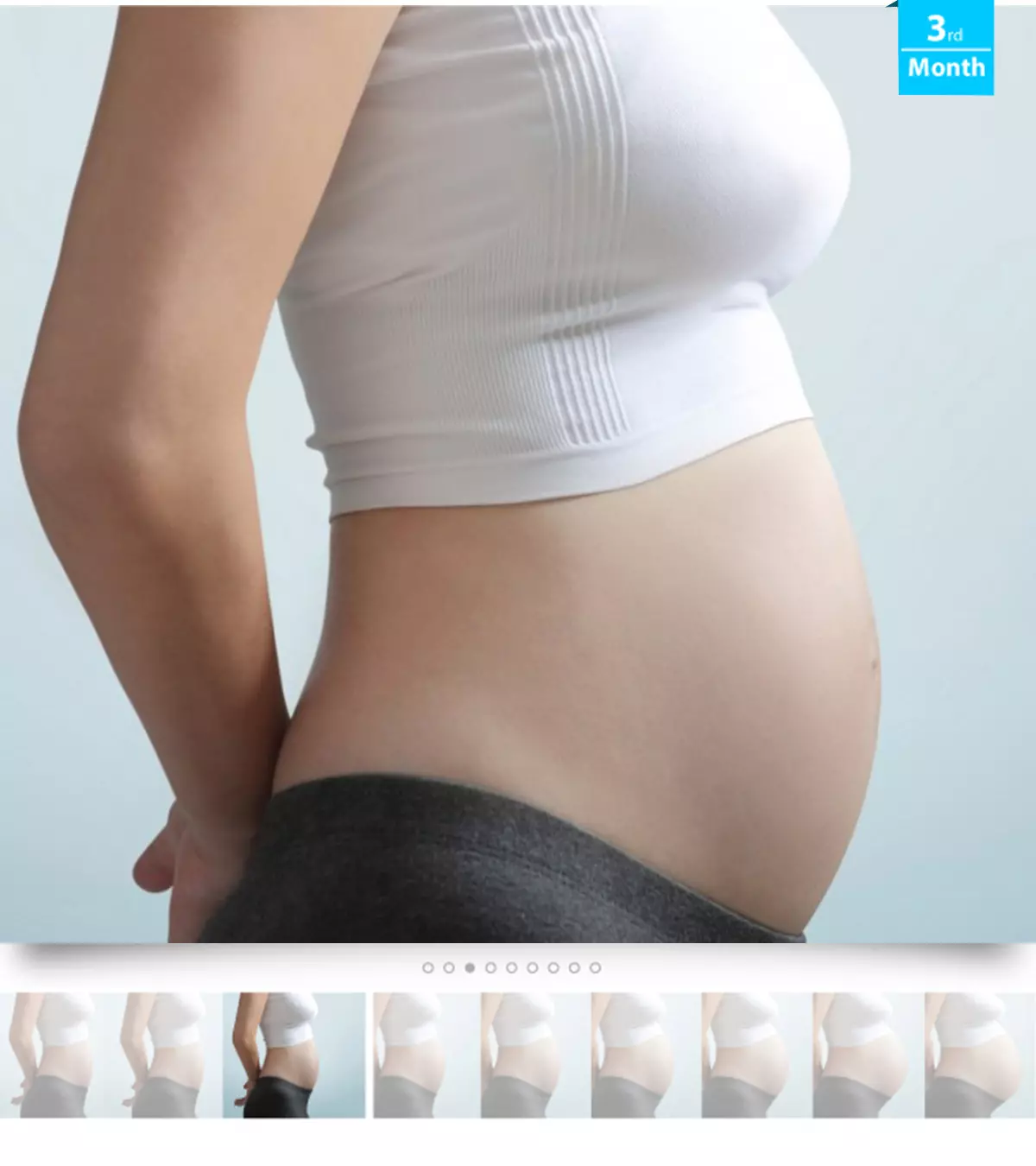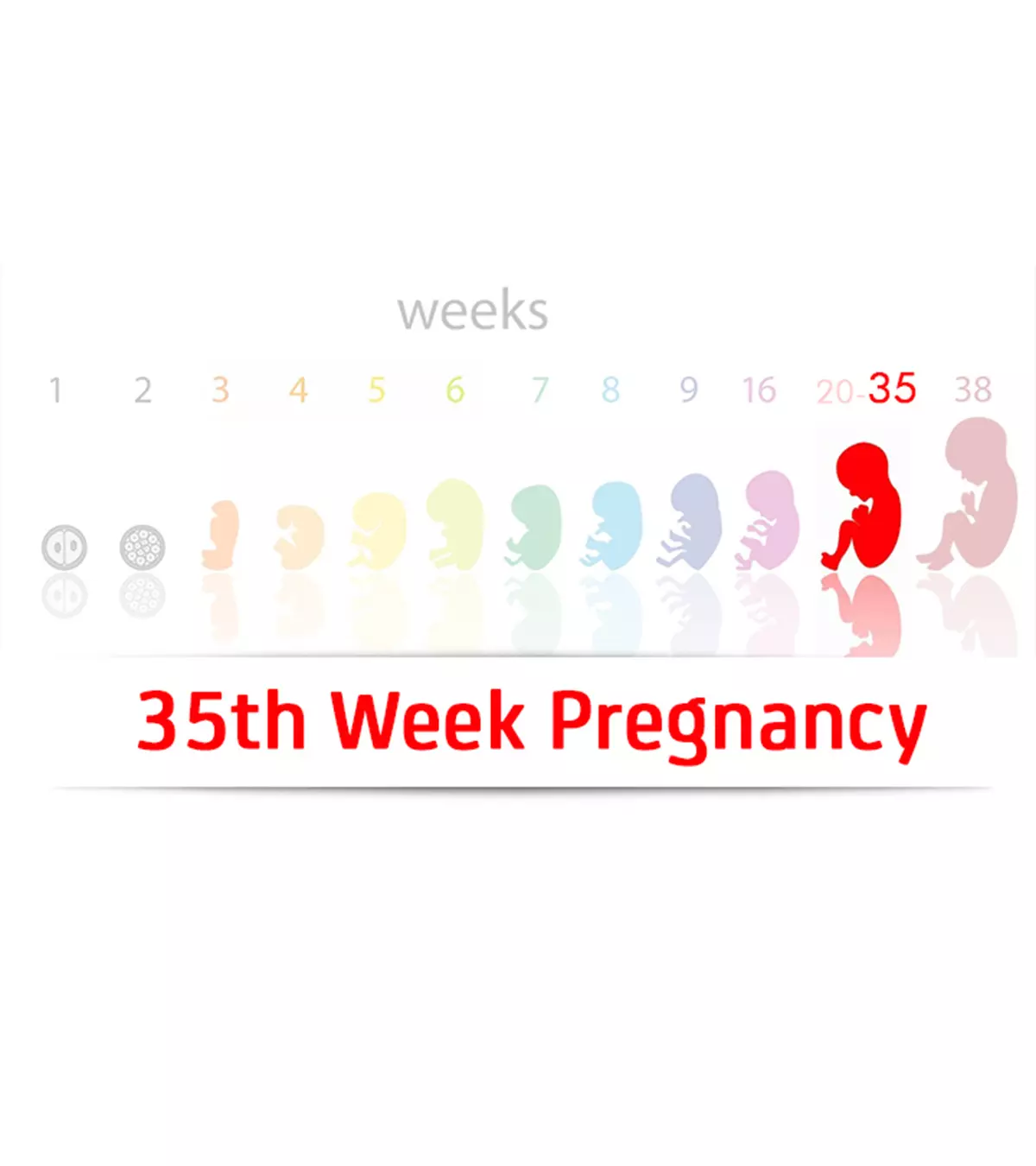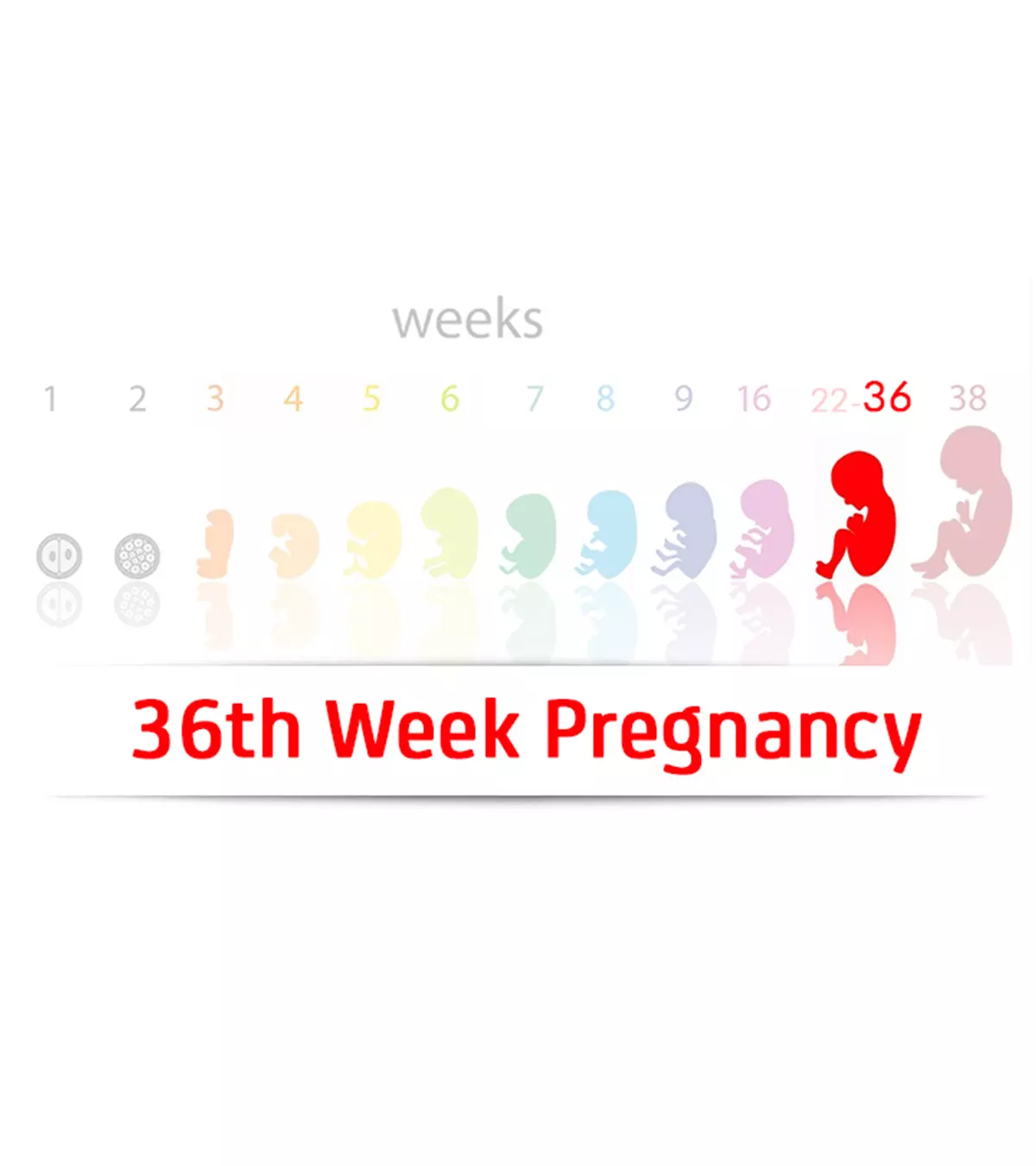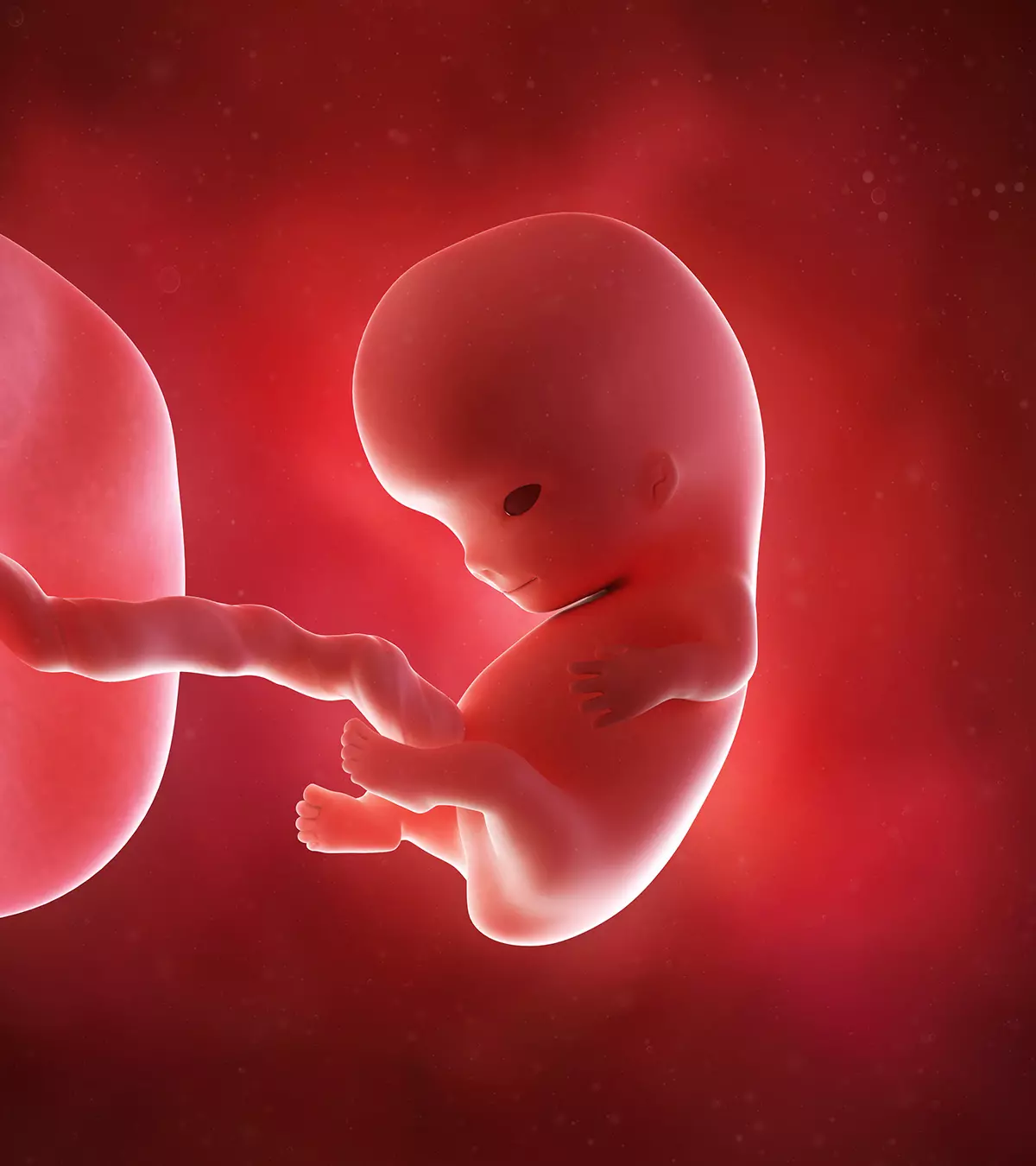
Image: Shutterstock
When 9 weeks pregnant, your hormone levels rapidly increase, bringing several physical, physiological, and emotional changes. While these changes may feel overwhelming, the good news is that you are a week closer to meeting your baby.

For those expecting their first child, knowing what changes they and their developing baby will have during this week will help them stay prepared for events, such as their first prenatal checkup visit. So, keep reading this post to learn about the 9th week of pregnancy, including your baby’s development and expected body changes, with valuable tips to stay healthy throughout this week and beyond.
Key Pointers
- At nine weeks pregnant, your baby measures about 1.67 inches (4.24 centimeters) in length and looks like a little human.
- Their skeleton has begun to harden, and their facial features, such as eyes, ears, nose, and mouth, are distinctly visible.
- While you may not look pregnant yet, you may be experiencing several symptoms, such as nausea, fatigue, and heartburn.
- Eat a well-balanced diet containing foods from different food groups to ensure you and your baby smoothly transition this week and beyond.
- Speak to your doctor immediately if you feel any unusual symptoms, such as severe vomiting, heavy bleeding, or a fever above 100.4°F.
How Many Months Is Nine Weeks Pregnancy?
At nine weeks of gestation, you are just starting the third month of your pregnancy
(1). Your fetus is developing rapidly at this stage, and you may experience notable physical and emotional changes. In just a month, you will enter the second trimester of your pregnancy and may see several more changes in you and your developing baby.
How Big Is Your Baby At Week Nine Of Pregnancy?
Your baby is about the size of a grape that measures about 1.67 inches (4.24 centimeters) in length (1).
What Is The Baby’s Development At Nine Weeks Of Pregnancy?
In the ninth week of pregnancy, your baby’s body parts continue to develop and change quickly.
This happens until the 10th week of pregnancy. The baby is now out of the embryonic phase and is entering the fetal phase. It means your little embryo is now a fetus. Now, the tail that was with the embryo disappears and looks like a little human being. Your baby’s essential body parts undergo a critical developmental transformation in the months to come (2) (3).
- Eyes: The eyelids completely cover the eyes; they are fused and don’t open till the 26th week of pregnancy.
- Ears: The earlobes are tiny and visible.
- Teeth: The tooth buds will begin to form under the gums. It is these tooth buds that will eventually become the baby’s teeth.
- Facial features: The nose, nostrils, and mouth become more distinct. The mouth appears as a flat line on the surface, and the tongue starts forming.
- Limbs: Fingers and toes are visible, and wrists and ankles begin to develop. Arms are growing and bend near the elbows.
- Neck region: Neck region becomes more defined. It also undergoes lifting and turning movements.
- Joints: All the joints, including the baby’s elbows, shoulders, knees, ankles, and wrist joints, start working. It allows the baby to move freely in the amniotic fluidi A clear, yellowish liquid surrounding and protecting the fetus during pregnancy .
- Digestive system: The digestive system and diaphragmiDome-shaped muscular structure present below the lungs, involved in the respiration process begin to develop, allowing the baby to breathe and hiccup.
- Skeleton and bones: At the ninth week of pregnancy, your baby’s skeleton starts to harden. CartilageiA connective tissue that provides protection and flexibility to the bones and joints forms all through the body.
- Common integument: Nipples and hair follicles slowly form.
- Intestinal system: The baby’s pancreas, gallbladder, bile ducts, and anus form. Also, the intestines elongate.
- Reproductive organs: Your baby’s reproductive organs develop when you are in your ninth week of pregnancy. Despite it, the girl and boy fetus look the same from the outside.
- Movements: Your baby makes squirmy movements and also starts kicking eventually.
- Heart and blood flow: Your baby’s heart begins to beat around the 24th day of gestation. But in the ninth week, it divides into four chambers, and valves start to form (1). The blood starts pumping in and out rapidly. It thus provides oxygen and nutrients to the baby’s growing body and likewise removes wastes from the body.
The developed placentaiA temporary organ that develops during pregnancy and provides the developing fetus with oxygen and nutrients now takes up the final task of producing hormones. The development of essential body parts is complete in this week of pregnancy. In the coming weeks, these body parts will be better defined structurally.
What Symptoms Of Pregnancy Do You Experience In The Ninth Week?
The symptoms you have experienced so far are likely to continue or become more intense this week. In fact, some women may experience some new symptoms as well. Here’s the complete list of nine-week pregnancy symptoms that mothers can keep under check:
- Nausea: Nausea usually begins before nine weeks of pregnancy. Even when it is usually called morning sickness, it can happen anytime during the day. Though it doesn’t affect your baby, it can affect your ability to work, rest, and eat properly. For most women, nausea subsides by 14 weeks. However, it may continue or last throughout pregnancy (4).
- Fatigue: Most women gain about 2 to 4 pounds (1 to 2 kg) in the first trimester and believe it to be the reason for fatigue (5). However, the fatigue is due to the turbulent changes your body is undergoing to support your baby’s development.
 Quick fact
Quick fact- Food cravings and aversions: Several mothers experience food cravings or aversion during pregnancy. While the precise cause for food cravings or aversions during pregnancy is unknown, they are often associated with hormonal changes that affect a mother’s sense of taste and smell (6).
- Mood swings: Mood shifts during pregnancy could occur for several reasons, such as fatigue and metabolic changes. However, significant changes in the estrogeniA hormone responsible for the development and functioning of female reproductive organs and progesterone levels affecting the chemical that regulates mood are the prominent reasons (7).

- Frequent urination: Hormonal changes and expanding uterus cause frequent urge to pee during pregnancy. You may avoid drinking too much water two hours before bed, cut caffeine intake, and empty your bladder before going to bed to improve the condition.
- Tender or tingly breasts: An increase in progesterone, (stimulated by the hCG hormone), and the development of milk ducts can cause the breasts to increase in size and feel tender, tingly, or sore. When breasts increase in size, their skin stretches and may cause itchiness (8) (9).
- Dizziness: Hormonal changes during pregnancy causes the blood vessels to widen and relax. It increases the blood flow to the fetus, but slows down the blood flow in the mother’s blood vessels. It causes a drop in blood pressure, resulting in dizziness (9).
- Spotting: Some women may have light bleeding or spotting before 12 weeks of pregnancy. Generally, this spotting isn’t a cause for concern. However, you should consult your doctor and determine the precise cause to ascertain your and your baby’s safety (10).
- Uterine cramping: The uterus grows and contracts throughout the pregnancy, causing ligaments and muscles around the abdomen to stretch. It’s the prominent reason some mothers feel cramping in early pregnancy. However, if you notice vaginal bleeding with pain, you should see your doctor immediately (11).
- Gas: Increasing progesterone levels cause intestinal muscles to relax, slowing digestion and increasing the time food takes to move through the intestines, causing excess gas production (12). To get relief, avoid eating gas-producing foods such as cabbage and beans. Also, don’t take any OTC anti-gas medication unless directed by your doctor.
- Heartburn and constipation: Hormonal changes during pregnancy relaxes the esophagus and stomach. Additionally, it slows down the food movement along the digestive system, leading to issues such as heartburn (or reflux) and constipation. Eating smaller meals frequently and avoiding spicy foods are a few ways you can prevent heartburn during pregnancy. On the other hand, drinking plenty of water and eating high-fiber foods can help prevent constipation.
- Acne: Hormonal changes during early pregnancy causes excess sebum production, causing acne in several women (13). You can prevent acne by keeping your face clean and using cosmetic products that don’t clog your skin pores.
- Increased sensitivity to smells: Many women experience heightened sense of smell during pregnancy, which can lead to nausea or aversions to certain foods. This is a common early pregnancy symptom and may help explain some food aversions experienced.
 Caution
CautionBesides these, increased hunger, backaches, headaches, gum bleeds, nose bleeds, dehydration, and bloating are some common symptoms of pregnancy that a woman may experience.
What Changes Occur In Your Body At Nine Weeks Of Pregnancy?
You may feel the pregnancy, but you may not look pregnant. Though there may not be any noticeable physical changes, you will begin to observe the changes in your body (3) (14).
- Waistbands go uncomfortable: Even if you don’t have a proper bump, you may still find your waistbands uncomfortable. Restrictive clothing around your waist can irritate you. Choose breathable and stretchy fabrics.
- Breast size increases: Your breasts increase because the ducts and glands begin developing at the early stage of pregnancy. You may also notice tiny blue veins that usually supply blood across the region. You should wear a maternity bra for a comfortable experience.
- Uterus size increases: Uterus increases double fold and will be now the size of a small melon. The area under the navel region becomes firm.
- Sense of taste and smell changes: Though all women in their pregnancy may not experience this, few sense these changes. The food you may have loved earlier can now completely put you off (15). One puff of your favorite perfume can make you gag. Try avoiding the things that irritate you, and do not worry since your senses return to normalcy after delivery.
- Blood circulation increases: The blood volume increases from five liters to seven or eight liters to support your growing baby. The major part of the increased blood is liquid plasma. The red blood cells usually increase in the second-trimester pregnancy. The blood circulation increases in the breasts, uterus, kidneys, and almost every organ, until delivery.
- Veins bulge: You will find bulging veins on your hands and legs. It is because of the extra blood that flows through them. These veins and the extra blood protect your baby while you stand or lie down. They also safeguard against the loss of blood you experience during delivery.
- Vaginal discharge increases: Vaginal discharge increases by now. It is normal during pregnancy but may cause infections in some women. The usage of panty liners may be helpful.
- Gain in body weight: You will gain weight that is more likely due to water retention in the body than the baby. However, gaining too much weight or losing too little weight can be harmful. Too much weight can increase the risk of high blood pressure, gestational diabetesi, complications during labor, and prolonged labor.
- Loss of libido: Some women show disinterest in sex, while some report showing more interest. Nevertheless, if you experience any bleeding during intercourse, you should check with your healthcare provider.
- Changes in hair: Your hair may turn lustrous and thick or thin, limp and greasy.
Though you may not feel like doing any physical activity, you can take short walks and do meditation and yoga. It will help keep you fit and also help in other attributes, such as the proper digestion of food (16).
What Are The Emotional Changes During The Ninth Week Of Pregnancy?
- Feeling of weakness: You will feel a bit weak during this period. You can feel fatigue and nausea. However, you will feel better by the end of the trimester.
- Sense of guilt: Some women in their ninth week of pregnancy may feel guilty that they aren’t able to feel maternal love. They may even worry that their negative feelings may affect their growing baby. But do not fret since it does not affect the baby’s growth. You can still show love to your baby by taking good care of your health.
- Exhaustion: Tiredness and exhaustion may take a toll on you. Always aim for an easy life and do not do things for which you don’t have the energy.

- Anxiety: It is obvious that you might feel anxious about your pregnancy. You may also worry about how others may react to the announcement of your pregnancy. Do not fret since workplaces now have everything in place to help you with maternity leave.
- Stress: Avoid any form of stress. If you have an argument with anyone, or if you are tired and fed up, chill out by listening to some music, take a warm bath, and try to relax by closing your eyes (17).
Making some time exclusively for yourself is important for your emotional health during pregnancy.
Will You Have Your First Ob-Gyn Visit?
The first examination will typically happen around the 9th or 10th week (33). During this visit, your doctor will assess the following:
- Medical history: Your doctor will find out about your health, details of your earlier pregnancies, and the health of your partner and family.
- Physical examination: The doctor will check your blood pressure, weight, and height and may discuss any chronic issues you have and how they can affect your pregnancy. Furthermore, they will check your thyroid, breasts, lungs, and heart and perform an internal examination of the vagina, uterus, ovaries, and cervix.
- Due date calculation: It is calculated based on the first day of your last menstrual period. A normal pregnancy lasts from 37 to 42 weeks; an average pregnancy lasts for 40 weeks, i.e., 280 days. If your menstrual cycle is irregular, your due date is based on your first ultrasound.

- Ultrasound: Most healthy women get two ultrasounds during pregnancy. The first scan happens between six and ten weeks of pregnancy and is called a dating scan or ultrasound. This scan dates your pregnancy, estimates your due date, checks your baby’s growth, and can tell how many babies you are expecting (18). It can also show some minor yet notable details, such as limbs. Megan Wilmarth, an avid blogger, shares her ultrasound experience at nine weeks of pregnancy. She says, “The most moving part of the ultrasound was seeing our little one’s heart fluttering at what seemed like a million times a minute! The baby was perfectly still, all cozy in the fetal position with what looked like its legs tucked up under and its arms up around its head (i).”
- Lab tests: Your doctor may perform some common prenatal tests by taking urine and blood samples.
- Genetic testing: Your doctor may ask you to take tests forTay-Sachs diseaseiA severe inherited neurological disorder marked by progressive degeneration of the nerve cells , Canavan diseaseiA neurodegenerative disease that inhibits the ability of nerve cells to send and receive information , cystic fibrosisi A genetic disorder that may cause severe damage to multiple organs, including the respiratory and digestive tracts , and sickle cell anemiaiA genetic disorder that distorts the shape of red blood cells, which impacts the oxygen transport in the body .
- Future appointments: Find out with your doctor about the upcoming tests and when you can schedule your appointments.
- Prenatal vitamins: You may get a prescription for prenatal vitamins that you must take during pregnancy.
Tips For A Better 9th Week Pregnancy
Expert Tips From A Gynecologist
1. Continue medical advice
You should continue the intake of folic acid as prescribed by your doctor. Visit your doctor more frequently. He will advise some baseline tests and sometimes special tests.
These tests include a specialized ultrasound scan called Nuchal Translucency Scan (NT Scan) to predict whether your baby is at risk of developing any abnormalities or not. You may opt for tests like first trimester serum testing (blood tests) to predict the risk more accurately.
You should not take any drugs without consulting doctors as they may be harmful for the developing baby.
2. Do not confine yourself to home
You should continue your daily activities that are possible without discomfort. Absolute bed rest may be harmful for you and your baby. So continue your normal activities indoor and outdoor but take care while travelling to avoid injury. Avoid prolonged sitting while travelling. Do not do strenuous exercise.
3. Intimacy
Most of the couples do not know whether they should continue physical relationship or not. Many fear that it might harm the pregnancy. But the fact is that sexual activity is not harmful, in general. However, it should be avoided if you have bleeding in pregnancy or other high risk factors like previous miscarriages.
Dr Sujoy Dasgupta
MBBS (Gold Medalist, Hons)
MS (OBGY- Gold Medalist)
DNB (New Delhi)
Fellow- Reproductive Endocrinology and Infertility (ACOG, USA)
Consultant Obstetrician and Gynecologist,
Specialist in Infertility and Sexual Dysfunction
Now is the time to receive prenatal care and here is how you need to go about it:
- Join a support group: If you are not able to cope with the stress and anxiety, you should join a support group. In support groups, you get to talk with other pregnant women that help you cope with the feelings you are undergoing. Additionally, there will be professionals who specifically deal with moms-to-be to calm their emotions.
- Beat stress: Whenever you feel overexcited or stressed, try doing deep breathing exercises or going for a brief walk. Doing so can reduce anxiety and lower your stress levels. Physical activities can release endorphins in the brain, which help increase overall happiness by reducing stress levels.
- Communication with your partner: You should always feel free to express your feelings with your partner. It helps him understand what is going on with you.
- Connect with your growing baby: Diane Sanford, the clinical psychologist, highly recommends setting at least 10 minutes aside every day to connect with your baby. You can start by relaxing in a calm area by taking deep breaths. Think about the dreams and hopes you have for your baby. You can also think about what kind of parenting style you can adopt for your child. It is a healthy way to get rid of stress and allows you to connect with your child in a better way.
- Learn about the tests: Find out about the diagnostic tests you may need to do in the ninth week of pregnancy. If you do not understand any test, talk to your doctor to learn about what that specific test is all about.
- Safe workplace: Learn about your workplace’s safety policies and ensure its safety for you and your baby. If you work in a chemical-based environment, bring the concerns to your doctor.
- Safe home: Some cleaning products, paints, mosquito repellents, and solvents contain toxic chemicals which can harm your pregnancy. Hence, mothers should minimize their exposure to these chemicals by following precautions, such as asking someone else to clean the home and keeping their home well-ventilated (19).
- Comfortable sleep: During this week, you may feel more tired because of the hormonal changes, morning sickness, and trouble sleeping. You may not get proper sleep because of the frequent visits to the bathroom. Try changing your sleeping positions if you are facing difficulty sleeping (20).
- Yoga: Enroll in a yoga or ante-natal exercise class after checking with your healthcare provider. It will help you meet and build up a network with fellow moms. If you are a jogger, try to get into any other form of exercise, such as walking. It is because jogging can impact your baby.

- Get vaccinated: Experts advise expecting women to take flu, COVID-19, hepatitis B, and Tdap (diphtheria, tetanus, and whooping cough) vaccines to keep themselves and their babies safe (21).
- Consider contacting a doula or midwife for timely support for a safe and smooth pregnancy journey.
- Keep yourself hydrated as increased blood volume during pregnancy requires adequate hydration. Aim for at least 8-10 glasses of water daily to support your body’s needs.
What Should Be The Nutrition At The Ninth Week of Pregnancy?
Maintaining a healthy and nutritious diet during pregnancy is vital for your and your baby’s health (22). Here’re some simple steps you can follow to eat nutritiously during this week.
1. Wholesome diet
- If you experience morning sickness, keep crackers or biscuits near your bed. Eat them before you get off the bed to reduce morning sickness.
- Ginger tea or ginger ale can reduce the effects of morning sickness.
- You can include healthy snacks in between your meals.
- Avoid smelling foods, and add a dash of lemon to your tea or water.
- Mint may also reduce nausea and morning sickness.
2. Vitamin B6
- Vitamin B6 is important during pregnancy.
- It helps in the production of red blood cells.
- Your doctor may prescribe you vitamin B6 supplements to add to your diet (23).
3. Magnesium
- Magnesium is important for both mom-to-be and baby.
- The main sources include rice, beans, and bananas. Some other potential sources include soybeans, nuts, sunflower seeds, and pumpkin seeds.
- You can also find magnesium in whole grains. Small traces are also found in non-refined cereals, leafy greens, and dairy products.
- Add these foods to your everyday diet (24).
4. Nutritious snacks

- You should include healthy snacks during pregnancy so that your body gets all the nutritional requirements.
- Whole grain bread, whole-grain crackers, and tomato soup are great options that ease morning sickness as well.
- Rusks, lemonade, and ginger tea are also healthy choices.
- You can also include bananas, nuts, and cucumbers.
- All these items are great for both you and your baby’s health.
Are There Any Tips For Dad-To-Be?
- Create a tranquil environment in your bedroom. For that, you can place dimmer bulbs in place of brighter ones.
- She may have mood swings that can annoy you. Try to deal with the situation calmly so that neither of you ends up in a bad mood.
- Show your love for her during her most wonderful phase to win her love for a lifetime.
When To Call A Doctor?
Call your doctor if you experience any of the following symptoms (25).
- Excessive or persistent vomiting/diarrhea
- Sudden or severe headache
- Severe or unusual abdominal pain and cramping
- A fever higher than 100.4 degrees Fahrenheit
- Heavy bleeding (soaking more than one pad an hour)
- Pain or burning sensation during urination
- Unusual vaginal discharge
- Swelling in the hands, fingers, or face
- Visual disturbances
Frequently Asked Questions
1. How should I sleep at nine weeks of pregnancy?
Although you may sleep on your back during the first trimester, it is advisable to practice sleeping on your left side. Sleeping on your left will reduce the pressure of the uterus on the veins, back, and other organs (20).
2. Can I have sex in the ninth week of pregnancy?
Unless directed otherwise by a doctor, women with normal and healthy pregnancies can have sex throughout pregnancy (26).
3. Can the nine-week pregnancy symptoms come and go?
It’s normal for pregnancy symptoms to come on go. In some cases, pregnancy symptoms may last longer than usual, whereas, for some, they may disappear sooner than expected.
4. Can I be nine weeks pregnant with no symptoms?
Most women will experience some pregnancy symptoms when nine weeks pregnant. However, in some cases, it is possible to be nine weeks pregnant and have very few or no symptoms.
Infographic: Changes During 9th Week Of Pregnancy
As you enter the ninth week of pregnancy, your body will change drastically to accommodate your growing baby. The infographic below includes some major physical changes you may have at this stage of your pregnancy. Knowing these changes can help you prepare yourself, especially if it is your first pregnancy. Illustration: Momjunction Design Team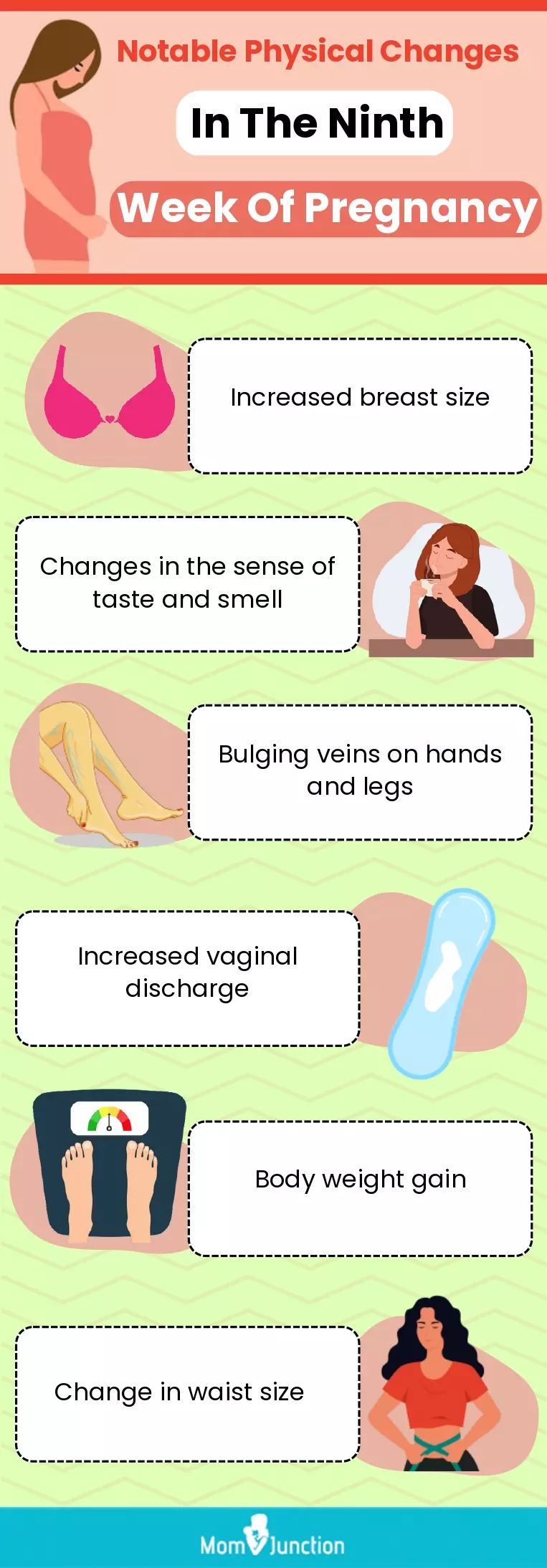
Illustration: 9 Weeks Pregnant: Baby Development Symptoms And Tips To Follow
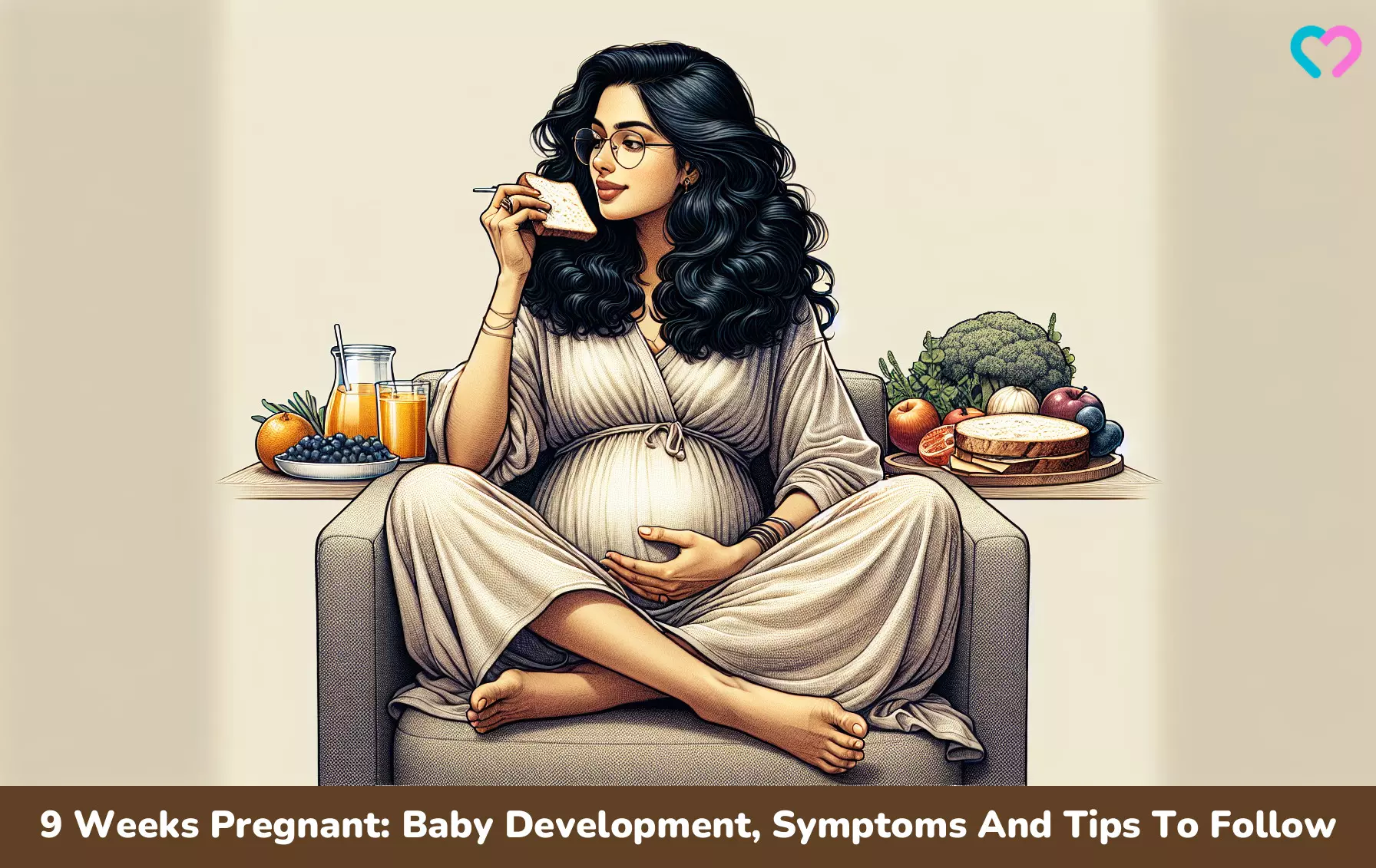
Image: Dall·E/MomJunction Design Team
Discover the transformations occurring in your body and your baby’s development during the 9th week of pregnancy and gain insights into what to anticipate in the upcoming weeks.
Personal Experience: Source
MomJunction articles include first-hand experiences to provide you with better insights through real-life narratives. Here are the sources of personal accounts referenced in this article.
i. Ultrasound #1 @ 9 weeks!.https://expectingsweetness.wordpress.com/2012/01/30/ultrasound-1-9-weeks/
References
- Pregnancy Week 9.
https://americanpregnancy.org/healthy-pregnancy/week-by-week/9-weeks-pregnant/ - Pregnancy at week 9.
https://www.pregnancybirthbaby.org.au/pregnancy-at-week-9 - The First Trimester.
https://www.hopkinsmedicine.org/health/wellness-and-prevention/the-first-trimester - Morning Sickness: Nausea and Vomiting of Pregnancy
https://www.acog.org/womens-health/faqs/morning-sickness-nausea-and-vomiting-of-pregnancy - Managing your weight gain during pregnancy.
https://medlineplus.gov/ency/patientinstructions/000603.htm - Food cravings during pregnancy.
https://www.pregnancybirthbaby.org.au/food-cravings-during-pregnancy - Mood Swings During Pregnancy.
https://americanpregnancy.org/healthy-pregnancy/pregnancy-health-wellness/mood-swings-during-pregnancy/ - Breast Changes During Pregnancy.
https://americanpregnancy.org/healthy-pregnancy/changes-in-your-body/breast-changes-during-pregnancy/ - Dizziness During Pregnancy.
https://americanpregnancy.org/healthy-pregnancy/pregnancy-health-wellness/dizziness-during-pregnancy/ - Bleeding in pregnancy.
https://www.tommys.org/pregnancy-information/pregnancy-symptom-checker/bleeding-pregnancy - Pregnancy Cramps.
https://americanpregnancy.org/healthy-pregnancy/pregnancy-concerns/cramping-during-pregnancy/ - Pregnancy Gas.
https://americanpregnancy.org/healthy-pregnancy/pregnancy-health-wellness/gas-during-pregnancy/ - Prevent pimples and avoid ‘maskne’ with pregnancy-safe acne treatments.
https://utswmed.org/medblog/pregnancy-acne-maskne/ - Pregnancy stages and changes.
https://www.betterhealth.vic.gov.au/health/healthyliving/pregnancy-stages-and-changes - 5 weird pregnancy symptoms you might not know about.
https://utswmed.org/medblog/weird-pregnancy-symptoms/ - Stages of Pregnancy.
https://womenshealth.gov/pregnancy/youre-pregnant-now-what/stages-pregnancy - Stress and Pregnancy.
https://www.pregnancybirthbaby.org.au/stress-and-pregnancy - Ultrasound scans during pregnancy.
https://www.pregnancybirthbaby.org.au/ultrasound-scan - Toxic household products to avoid during pregnancy.
https://www.pregnancybirthbaby.org.au/toxic-household-products-to-avoid-during-pregnancy - Sleeping While Pregnant: First Trimester.
https://www.sleepfoundation.org/pregnancy/sleeping-during-1st-trimester - Vaccinations Needed During Pregnancy.
https://www.immunize.org/wp-content/uploads/catg.d/p4040.pdf - Nutrition during pregnancy.
https://www.acog.org/womens-health/faqs/nutrition-during-pregnancy - Morning Sickness.
https://medlineplus.gov/ency/patientinstructions/000604.htm - F Parisi et al.; (2018); Micronutrient supplementation in pregnancy: Who what and how much?
https://journals.sagepub.com/doi/full/10.1177/1753495X18769213 - When to Call Your Healthcare Provider During Your First Trimester of Pregnancy.
https://my.clevelandclinic.org/health/articles/9699-first-trimester - Sex in pregnancy.
https://www.nhs.uk/pregnancy/keeping-well/sex/#:~:text=It%27s%20perfectly%20safe%20to%20have,cannot%20tell%20what%27s%20going%20on. - Is Any Acne Treatment Safe To Use During Pregnancy?
https://www.aad.org/public/diseases/acne/derm-treat/pregnancy
Community Experiences
Join the conversation and become a part of our nurturing community! Share your stories, experiences, and insights to connect with fellow parents.
Read full bio of Dr. Karla S. Sanchez-Banos
Read full bio of Swati Patwal
Read full bio of Rebecca Malachi
Read full bio of Aneesha Amonz






